TODAY’S BIBLE READING: REVIEWING THE PAST AND MOVING INTO THE FUTURE; THE BOOK OF NUMBERS and DEUTERONOMY; JESUS AND THE SABBATH
MARCH 23- Numbers 36:1-13; Deuteronomy 1:1-46; Luke 5:29-6:11; Psalm 66:1-20; Proverbs 11:24-26
Today we will finish reading the Book of Numbers and begin the Book of Deuteronomy!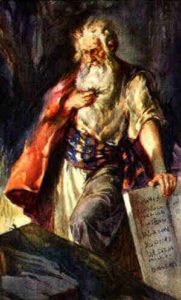
We have read four of the five books of Moses (The Pentateuch). When we have finished reading Deuteronomy, we will have completed the TORAH, the first part of the Tanakh, the Jewish Scriptures! Well done, readers!
The Book of Numbers gives us the big picture of the 40-year pilgrimage of those whom God delivered from Egypt.
The New Testament author, Paul the Apostle, writes, “Now these things happened as examples for us” (1 Cor 10:6). We receive instruction and warning from the example given from their journey, learning that God has our best interests in mind. He is Sovereign and He is good. But His thoughts are not our thoughts and His ways are not our ways. He has a greater vision for humankind than we do. He has a greater vision for humanity than the humanist! He does not bow to human opinion. He is patient to the degree that He recognizes our slowness to believe. But His purposes stand firm as He pursues His objectives. We are called to a worldview that is God-centered rather than man-centered. This worldview is resisted by our deceitful hearts, and yet one day, every knee will bow to this reality.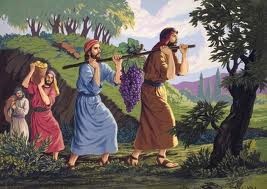
In the Book of Numbers, we see that God did not go along with the majority vote concerning the Promised Land. Those who opted for doing what was right in their own eyes paid the price for not trusting God for what He promised. The unbelief of those who issued and echoed the majority report caused an entire generation to be excluded from entering Canaan. Joshua and Caleb were the only exceptions. Why? Because they “wholly followed the Lord”.
What lessons did we learn from reading The Book of Numbers?
First, I could not help but marvel at the Lord’s patience and perseverance with the people He miraculously delivered, daily provided for, and before whom He manifested His presence.
Secondly, I learned that our mental attitudes are critical for our personal progress and in our relationships. Negativity, complaining, murmuring, selfish preoccupations and jealousies gave rise to grumbling, rebellion, and death within the camp. A lack of gratitude for the fresh manna and their familiarity with the things of God caused the entire camp to lust after their former life of bondage in Egypt. Their perception was so distorted that they called Egypt the land of milk and honey (Numbers 16:13)! Have we lost a sense of wonder and thankfulness for God’s blessings and presence among us, that we find ourselves lusting after and pursuing the vain glories and deceptive pleasures of a corrupted world-system?
The Book of Numbers ends with laws pertaining to the extension of a family’s inheritance.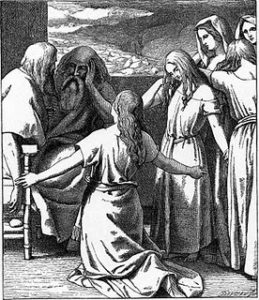
We are learning as we read through the Bible that God takes special notice of the poor and those whom societies so often oppress—women, children, the foreigner, the widow, the sojourner and those threatened with injustice because of their perceived wrongdoings and who have not been provided with a fair trial. The request of the daughters of Zelophehad to receive the inheritance land of their fathers had been heard. This would keep the land for future descendants.
There was a further expressed concern that one tribe would benefit at the expense of another if the women who had land titles married husbands from another tribe. To ensure the tribal inheritance would not be lost, the heiresses were directed to marry only within their tribe. It is wise to have all our decisions, not the least of which, the decision of a marriage partner, subject to the will of the Lord.
DEUTERONOMY 1:1-46
Welcome to the Book of Deuteronomy. The word means “Second Law”. It is a renewing of the covenant of Sinai. The terms of the covenant are reaffirmed. It is referred to as “the Book of the Law”.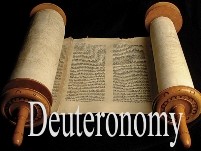
In the 7th century it was the lost book. During the reign of King Josiah, Hilkiah, the High Priest discovers “the Book of the Law” while they are repairing the temple in Jerusalem (2 Kings 22:8). Shaphan, the king’s secretary reads the Book to the king. When the king hears the words read, he is convicted of his sin by the Holy Spirit. He tears his clothes in grief and deep repentance. He realizes that he and his forefathers have failed to honor the Lord of the covenant made at Sinai. The Book of Deuteronomy had been found. The phrase “the Book of the Law” is used in the Pentateuch only in reference to Deuteronomy.
Deuteronomy had a profound impact on King Josiah. It resulted in both a reformation and a short-lived revival in Judah. Perhaps as we read the “Book of the Law” and understand its revelation of Christ, we too will be inspired to fresh repentance and obedient action. May it renew our vision of God’s holiness and give us a fresh appreciation of His faithfulness to fulfill His demands for righteousness on our behalf (both for us and in us) through Christ Jesus.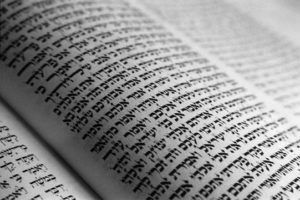
The Hebrew name for this Book is ‘Devarim’, meaning ‘the words’, or ‘the real things’ taken from the first Hebrew word on the scroll:
“These are the words which Moses spoke to all Israel across the Jordan in the wilderness” (Deuteronomy 1:1)
The opening and closing words of Deuteronomy give us a key to its interpretation.
The final words, most likely written by the hand of Joshua, declares:
Since that time no prophet has risen in Israel like Moses, whom the Lord knew face to face, [11] for all the signs and wonders which the Lord sent him to perform in the land of Egypt against Pharaoh, all his servants, and all his land, [12] and for all the mighty power and for all the great terror which Moses performed in the sight of all Israel. (Deut 34:10-12)
What we have in Deuteronomy are the final words of Moses emerging from his face to face friendship with the Lord. The Book consists of three messages. Moses could not have given these on the day of their exodus. His knowledge of the Lord had grown with his forty years of continuing revelation and discipline.
Moses’ utters these speeches not from his ‘head knowledge’ but from having had the benefit of being progressively instructed by God in the knowledge of His holiness, His will, and His ways.
At the end of it all, Joshua could say of Moses, “since that time no prophet has risen in Israel like Moses, whom the Lord knew face to face”.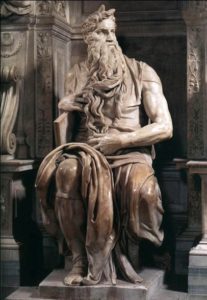
The first speech recounts their history in the wilderness (Deut 4:1-4:43).
The second speech expands on the ethical teaching of the Ten Commandments (Ethical Decalogue) (Deut 4:44- 11:32).
The Deuteronomic Code (Deuteronomy 12-26) contains a series of commands (‘mitzvot’) instructing them how to live in the Promised Land.
Deuteronomy 27-28 contain blessings upon the obedient and curses upon the disobedient.
The third speech (Deuteronomy 29-30) contains the renewal of the Covenant that was made at Sinai. Moses appoints Joshua as his successor who will lead them across the Jordan to conquer and settle the land of Canaan. Moses gives the written law to the priests who are to read it before the people at the end of every seven years at the Feast of Tabernacles.
Deuteronomy 31-34 provides supplementary information: the succession of Joshua (31), the Song of Moses (32) the Blessing of Moses (33) and the Death of Moses (34).
The events in the book of Deuteronomy take place within the last two weeks of the 11th month of the 40th year of desert wandering. The 12th month is spent mourning Moses ((34:8). They will enter the Promised Land on the tenth day of the first month of Nisan (Joshua 4:19) of the 41rst year after the Exodus.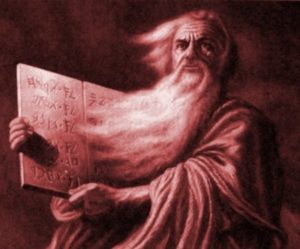
Moses’ final speeches in Deuteronomy are essential. He is speaking to a new generation and is giving them necessary understanding of their history and how they are to meet the challenges of the future. “Go up and take possession” was the command of the God who was forsaken by their fathers. The former generation had slandered God’s character, saying, “Why is the LORD bringing us into this land, to fall by the sword?”. They are not to do the same. They are to trust the Lord who goes before them. If they do so, their victory is assured.
Moses repeats the history of their journey in the wilderness to ensure that the lessons stay fresh in their minds as they face new challenges in the conquest of Canaan.
NEW TESTAMENT READING: Luke 5:29-6:11
It would have been very interesting to attend the party that Matthew (Levi) hosted in his home with Jesus as the honored guest. What a mixed group of people! Pharisees and scribes in the same room with tax-collectors and sinners.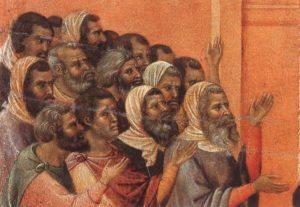
There are some who recoil at the idea of being called a sinner. Some mistakenly believe in the perfectibility of the human race; and that all human beings are basically ‘good at heart’. Jesus popped that balloon in every encounter. He came into this world to destroy the work of the devil- which is the work of sin in the human heart. Sin is a terminal disease, far more severe than cancer, AIDS or the corona virus. The only cure for sin is the saving work of Christ. Those who are in the greatest peril are those who see no need for the cure. Self-righteousness is one of the symptoms of the disease— for it blinds and deceives the mind.
When the religious professionals, the scribes and the Pharisees, ask Jesus why He eats with the tax collectors and sinners, he replies, “It is not those who are well who need a Physician, but those who are sick. I have not come to call the righteous, but sinners to repentance.”
May we not be blinded to our need for Christ and His atoning work on the cross for the forgiveness of sins.
The Pharisees again display further symptoms of their disease by claiming righteous superiority through the practice of piety, fasting, and prayers. Jesus responds that piety without Divine Fellowship is empty. The purpose of the attendants of the bridegroom is to observe the bridegroom, attend to his needs and participate in what He is doing. Jesus said you cannot give orders to the attendants of the bridegroom to fast when he is feasting, or to offer prayers of petitions when he is singing a song of joy!
Jesus’ reply shows how religious activities and practices of piety can be at cross purposes with God. Jesus, the heavenly Bridegroom, calls us into a life of fellowship. There will be times of feasting and fasting. The governing factor is Jesus. It is not religious regulation but divine fellowship with His presence, His life, His Word, and His church that determines appropriate actions. Let us do what we see Him doing, through the revelation of His Word and His Spirit.
The arrival of the Messiah means a new day for Israel. It heralds the promised New Covenant (Jeremiah 31:31). It is a time to put off the old and put on the new. However, Jesus was aware that some will say, “the old was good enough” (Luke 5:39)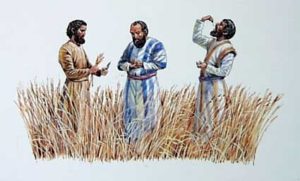
When Jesus is accused of breaking the law of God, while He and his disciples pick and eat grain on the Sabbath, Jesus demonstrates that He is the author of the Law and the Sabbath. He knows what the Sabbath was given for. He also knows Scripture and history. He cites the precedent of David, when he was hungry, taking the consecrated showbread, which lawfully was only for the priests, and eating it with his friends (1 Sam 21:6). David violated the letter of the law because he knew what the law was about. He was learning of the One who gave the law. He recognized the spirit of the law.
The Sabbath was a sign given to Israel of their covenant relationship to God. It means “rest”. Jesus knew that the Sabbath was given to remind His people to rest in the perfect sufficiency of God’s work on their behalf. The Sabbath was made for man, not man for the Sabbath. It was a gift to rest in. The Sabbath is a reminder of God’s rest in the sufficiency of the finished work of the first Creation (Gen. 2:2). Jesus came to offer us God’s rest in the sufficiency of the finished work of the New Creation in Christ.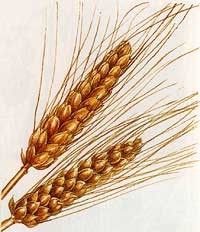
The Pharisees would not dare to criticize the actions of Israel’s great King David. Now a greater than David was in their midst, and they criticize him for violating a law of which He was the Author! The intention of the law was not to cause hunger or harm, but to point to the rest that He Himself would provide. Is it any wonder that Jesus feeds and heals on the Sabbath? The Sabbath points to His Lordship. He is Lord of the Sabbath. The true Sabbath of Israel is found in a person. In trusting Him and fellowshipping with Him one can find rest.
Matthew 11:28
“Come to Me, all who are weary and heavy-laden, and I will give you rest (SHABBAT).
TODAY’S PSALM: Psalm 66:1-20;
This Psalm has two major sections. The first section has the national history in view. The second is personal.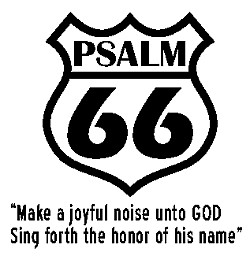
Verses 1- 12 is a call to the nation to raise their voices in praise to God. Shout, sing, praise, worship, bless His Name, sound His praise abroad. Sing, sing, and sing some more. In their national history, God severely chastened them. The result was refinement and deliverance into a place of abundance (v.10,12)
The second section (verse 13-20) is a personal testimony. The writer expressed thanks to God for providing deliverance in a time of trouble. In his time of distress, the writer had made some vow (v.13-14). In the light of the New Testament we see clearly that it is not necessary to bargain with God in prayer. Our prayers are made on the merits of Christ and not our pledges (“If you do this then I will do that”).
Prayer involves open and honest communication with God. Unconfessed sin hinders prayer. Therefore, confession should be a part of our prayer life (1 John 1:7,9).
Psalm 66:18 (NASB) 18 If I regard wickedness in my heart, The Lord will not hear.
Vows are voluntary. If vows are made, they are to be kept. God is building our characters so that we become men and women who are true to our words.
TODAY’S PROVERB: Proverbs 11:24-26 – A CALL TO GENEROSITY
There is one who scatters, and yet increases all the more,
And there is one who withholds what is justly due, and yet it results only in want.
The generous man will be prosperous,
And he who waters will himself be watered.
He who withholds grain, the people will curse him,
But blessing will be on the head of him who sells it.
This reminds us of Luke 6:38- “Give, and it will be given to you. They will pour into your lap a good measure—pressed down, shaken together, and running over. For by your standard of measure it will be measured to you in return.”
PRAYER FOR THE NATIONS- BURUNDI, AFRICA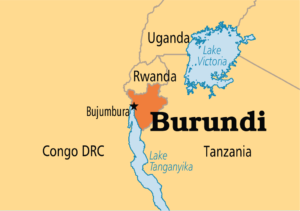 The Republic of Burundi is a mountainous, fertile country of the northeast shore of Lake Tanganyika, south of its twin Rwanda.
The Republic of Burundi is a mountainous, fertile country of the northeast shore of Lake Tanganyika, south of its twin Rwanda.
Answer to Prayer
Praise God for stability, manifested through the signing of a peace accord by every rebel group, a new constitution and an elected government that represents both Hutu and Tutsi. After the horrors of this region of Africa in the 1990s, Burundi has made significant progress. Over 450,000 people once uprooted have now returned home. Most refugee camps have closed or are closing, and some IDP camps have become permanent. The current president is a professing born-again Christian.
Challenge for Prayer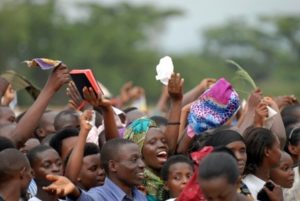
The socio-political situation is one of cautious hope. There have been many encouragements, but threats to the fragile new peace remain. The final rebel group, the FNL, signed the peace accord only in 2008. Pray for these key issues:
- a) Decades-old enmity between Tutsi and Hutu that boiled into a violent eruption claiming 300,000 lives in the 1990s has simmered down with the peace accord and representational government. The systematic humiliation of Hutus has all but ceased, leading to a more peaceful co-existence. There is widespread intermarriage between these groups. Pray for genuine respect and cooperation as these two peoples build Burundi’s future together.
- b) The president is a former leader of a rebel Hutu group. He is a believer and has actively sought the counsel of Church leaders on several issues. His relative political inexperience, his past as a rebel fighter and Satan’s desire to tear down Christian leaders each pose a danger; pray for moral integrity, wise advisors and spiritual grace to do the right things in the right way.
- c) The surplus of firearms from decades of conflict contributes to the sudden rise of violent crime, especially armed robbery. With widespread poverty and no proper disarmament program, such an occurrence was almost inevitable. Pray for the effectiveness of disarmament and gun amnesty programs, many of which are run by church bodies; pray for people to hand in their weapons and pursue peace rather than lawlessness.
- d) Widespread corruption persists, with bribery all but requisite for transactions of almost any nature. A 2008 survey ranked Burundi among the top states where corruption is worsening. The anti-corruption body has failed in its efforts to bring improvement. Pray for the lasting change only the gospel can bring.
PRAYER: Father, we thank You for the revelation of Your Word, and that we can believe it and rest in it. We rest in the perfect provision of Your Son. Help us to live in the light of all that He has accomplished on our behalf. We find our sabbath rest in Him. Holy Spirit, motivate us to be generous towards others, freely giving what we have freely received. Keep us from ‘negative mental attitudes’, familiarity and complaining. Give us thankful hearts and the power for fruitful service. In Jesus’ Name. Amen.
Pastor David
So, naturally, we proclaim Christ! We warn everyone we meet, and we teach everyone we can, all that we know about him, so that, if possible, we may bring every man up to his full maturity in Christ. (Colossians 1:28, J.B. Phillips paraphrase)
New Life Community Church, Concord, MA 10742
www.newlife.org
